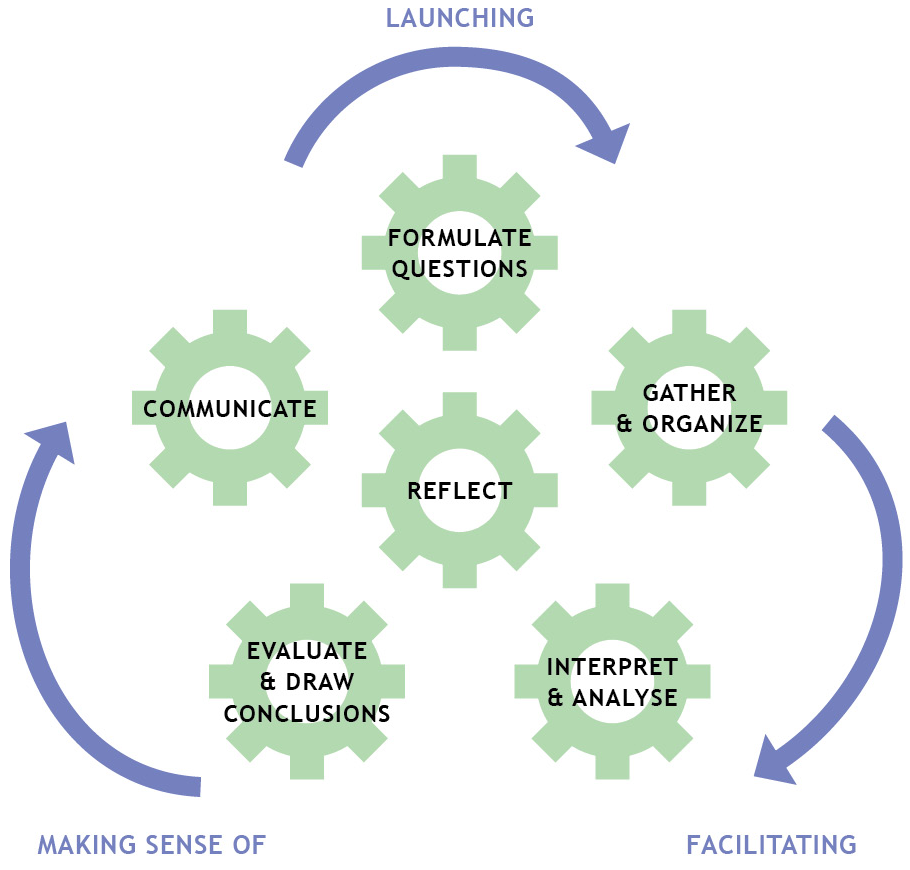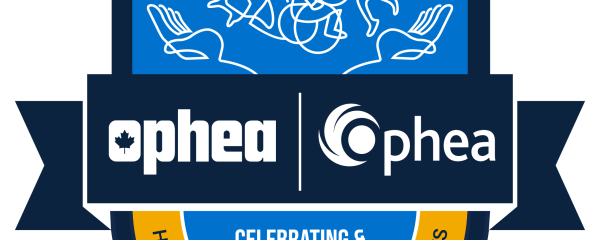Inquiry-based learning is a student-centered learning approach that supports students in developing critical- and creative-thinking skills and other social-emotional learning skills in health and physical education (Ophea, 2021).
Inquiry-based learning is a process in which students are involved in their learning by formulating questions, investigating widely, and then building new understandings, meanings, and knowledge. As seen in Figure 1, the three stages include: first launching an inquiry in which students formulate questions to explore their topic; next, the educator facilitates the process of students gathering and organizing their information; and finally interpreting and analyzing information. In the final stage of making sense of data, students evaluate their information in order to draw conclusions. The resulting knowledge is then used to answer a question, develop a solution, or support a position or point of view. Students then communicate what they have learned and reflect on their learning process (Alberta Learning, 2004).
Figure 1: Inquiry Framework for Health and Physical Education: Six Components of Inquiry-Based Learning (Ontario Ministry of Education, 2013).

Long Description for Accessibility
Inquiry-based learning can be highly effective in helping students become food and media literate, particularly in deepening their understanding of food advertising and food marketing techniques in various media forms. As students pose their own questions about food labels, claims, marketing, advertising and media influences, their curiosity is piqued and as a result they are more engaged in their learning. Having students examine food marketing and advertising in various media texts and forms helps them develop higher-order thinking skills, such as analyzing, synthesizing, evaluating, and drawing conclusions. Students apply their new understanding to make decisions, set goals, determine solutions related to their food choices and healthy eating patterns, and formulate healthy eating plans. Students learn to consolidate and communicate their observations about food claims, marketing, advertising, and media influences in order to advocate for and promote healthier food choices for themselves and others. Finally, students reflect on what they have learned, what they might need to know more about, and how they might transfer their learning to new situations in order to take greater responsibility for their lifelong health and well-being.
Using an inquiry approach to help students become food and media literate can begin by adopting a questioning stance, posing overarching and topic-specific questions to pique student interest.
Sample questions:
- “How do you decide whether a product is nourishing and will support your nutritional needs? What is the most reliable way to determine healthier products?”
- “What colours are most often used on food packaging that is marketed for young children?”
- “Why might these colours be used more often than others? How might these colours influence the intended audience? What messages might these colours imply to the consumer?”
- “What characters are most effective and appealing to a wide variety of audiences? How much might these character’s influence a person’s food choice and food decisions?”
- “What characters or celebrities would you choose to endorse a food product and why? What makes them a good representative for the product?”
- “What are the most effective strategies food marketers try to use to influence you and your peers?”
- “What are the best strategies that you would recommend as a student advocate for others to use to respond to marketing and media influences”? Why?”
- “Create three effective media messages that you think would promote healthier eating choices and decisions for students in your age group, and explain why the messages would be effective.”
- “What resources and support might you access in your community to help you advocate for greater access to healthier food options and responsible food advertising in community venues? Why would you choose to approach them? What would you say? What would you ask them to do and why?”
For more information on inquiry-based learning approaches consult Ophea's Inquiry-Based Learning resource.
References
Adapted from: Ophea. (2021). Inquiry-Based Learning. Retrieved from: https://ophea.net/inquiry-based-learning
Adapted from Alberta Learning. (2004). Focus on Inquiry: A educator’s guide to implementing inquiry-based learning. Edmonton, AB: Alberta Learning and Ophea. (2021). Inquiry-Based Learning. Retrieved from: https://ophea.net/inquiry-based-learning/understanding-inquiry-health-a…
Ontario Ministry of Education. (2013). The Ontario Curriculum, Grades 1 to 6: Social Studies; Grade 7 and 8: History and Geography. Retreived from http://www.edu.gov.on.ca/eng/curriculum/elementary/sshg18curr2013.pdf




